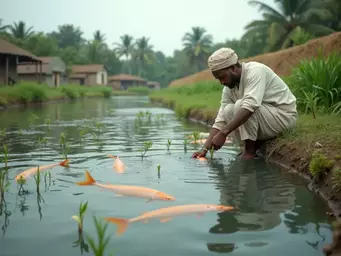Economic Role
Aquaculture's Contribution
- ✓ Food Security
- ✓ Job Creation
- ✓ Trade & Export
Unlock strategic insights and practical guidance for your aquaculture venture. Join our community of thriving fish farmers!
Posted on: 2025-09-06
By: Kwame Adom
Did you know that small-scale fish farming is poised to transform local economies in Nigeria? As demand for fish rises, opportunities abound for entrepreneurs ready to dive into aquaculture!
Small-scale fish farming is a vital component of Nigeria's economy. The visual below highlights its economic role, essential practices, and sustainable approaches. For a deeper dive into modern farming techniques, explore modern farming techniques.
As an aquaculture enthusiast, I've seen firsthand the potential that small-scale fish farming holds for transforming local economies in Nigeria. The country's vast water resources and growing demand for fish create an exciting landscape for aspiring farmers to thrive. With the right knowledge and resources, anyone can take the plunge into aquaculture!
This section will delve into the critical role that fish farming plays in Nigeria's economy and explore the practices that define small-scale fish farming today. By understanding these dynamics, you can better position yourself to succeed in this field.
Aquaculture serves as a vital component of Nigeria's agricultural sector, contributing significantly to food security and economic growth. With a population that relies heavily on fish as a primary protein source, the demand continues to rise, opening up numerous opportunities for fish farmers.
As we explore more about the economic landscape, it's crucial to recognize how small-scale fish farming not only meets dietary needs but also empowers communities through job creation and income generation. This is where your journey can begin! Discover more about the Small Farm Business Ideas that can complement your aquaculture venture.
Small-scale fish farming involves various practices tailored to local environments and resources. The beauty of this industry lies in its adaptability; whether you're starting with a few fish in a backyard pond or launching a larger operation, there are essential practices to consider.
By focusing on these practices, you can build a robust foundation for your fish farming venture. Remember, starting small and scaling up as you learn is a key strategy to ensure long-term success in the aquaculture industry!
Sustainability is at the heart of modern fish farming. As aquaculture evolves, embracing sustainable practices is not only beneficial for the environment but also for your bottom line. By implementing eco-friendly methods, you can protect water resources while enhancing productivity.
Exploring these sustainable practices will help you create a fish farming operation that’s both profitable and environmentally responsible. As you embark on this journey, remember that sustainability will attract more customers who value ethical sourcing!
To maximize your success in small-scale fish farming, consider joining local aquaculture groups or online forums. Engaging with fellow farmers allows you to share experiences, learn best practices, and stay updated on market trends. Networking can open doors to invaluable partnerships and insights that can elevate your farming practices and profitability!
As we come to the end of our exploration of market leadership in fish farming, it's essential to reflect on the key aspects that can help you thrive in this competitive landscape. By understanding the dynamics of your local market and implementing effective strategies, you can position your small-scale fish farm for success. Let’s dive into some key takeaways!
These takeaways are not just tips; they are stepping stones on your journey to success. By focusing on these areas, you’ll be better equipped to face challenges and seize opportunities in the fish farming sector.
The future of fish farming in Nigeria looks promising! With a growing population and rising demand for affordable protein sources, the aquaculture sector has the potential to flourish. As I’ve seen throughout my journey, embracing innovation and sustainable practices can significantly enhance productivity and profitability. For more insights into future growth, read about the future of farming.
Moreover, as local markets expand, farmers who stay ahead of trends—like consumer preferences for organic and locally sourced fish—will find themselves at a strategic advantage. Are you ready to adapt and thrive in this evolving environment?
Government policies play a crucial role in the growth of the fish farming sector. Initiatives aimed at providing financial support, improving infrastructure, and offering training programs can significantly impact your business. For instance, favorable regulations can ease the process of obtaining licenses, while investments in research and development can lead to better farming techniques.
By staying informed about these policies and advocating for beneficial changes, you can help shape a more supportive environment for fish farming in Nigeria.
Here are some common questions about small-scale fish farming in Nigeria, based on the information discussed in this article:
Here is a quick recap of the important points discussed in the article:



 As the demand for fish continues to rise, Ghana's aquaculture sector presents a wealth of opportunit
As the demand for fish continues to rise, Ghana's aquaculture sector presents a wealth of opportunit
 Did you know that small-scale fish farming is poised to transform local economies in Nigeria? As dem
Did you know that small-scale fish farming is poised to transform local economies in Nigeria? As dem
 In the world of aquaculture, success stories abound, but what are the lessons that can drive aspirin
In the world of aquaculture, success stories abound, but what are the lessons that can drive aspirin